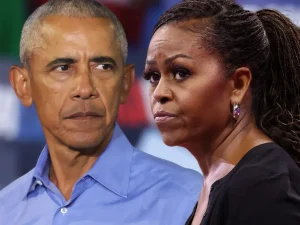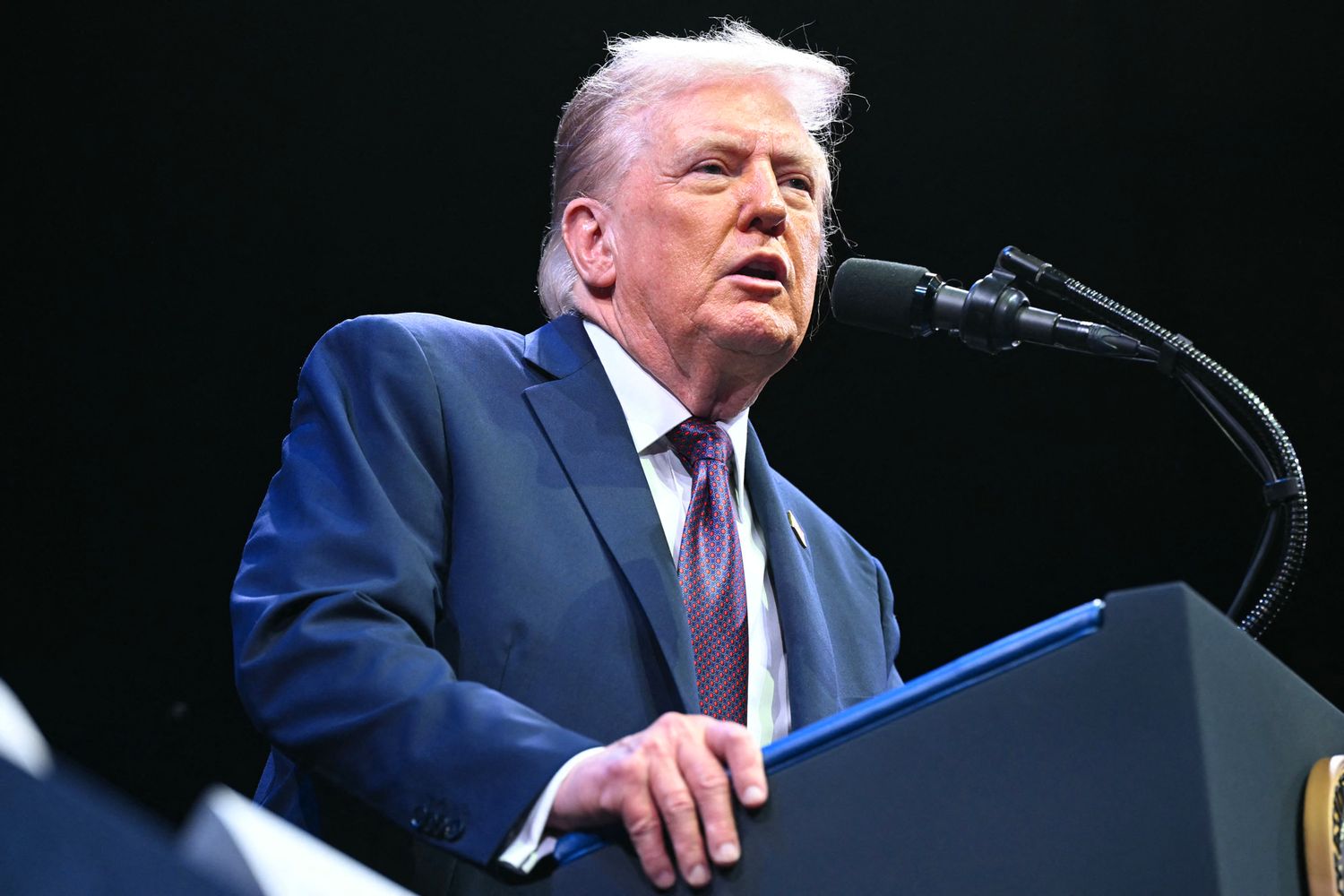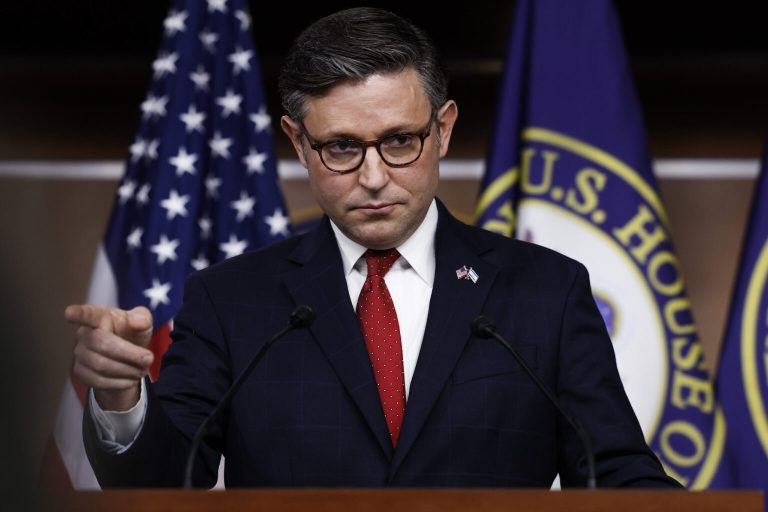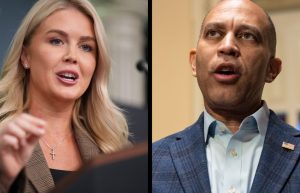Trump’s Commutation of George Santos’ Sentence Ignites National Discussion on Justice and Clemency
President Donald Trump has once again reshaped the national conversation around justice and presidential power. On Friday, he announced the commutation of former New York congressman George Santos’ seven-year federal prison sentence for wire fraud and identity theft — a move that instantly divided opinion in Washington and beyond.
The order, issued via Truth Social, frees the 36-year-old former lawmaker effective immediately and converts his remaining prison time to “time served.” Trump justified his decision by describing Santos as “a rogue” who had “been horribly mistreated” while in federal custody.
“George Santos was somewhat of a ‘rogue,’ but there are many rogues throughout our Country that aren’t forced to serve seven years in prison,” Trump wrote. “George has been in solitary confinement for long stretches of time and, by all accounts, has been horribly mistreated. Therefore, I just signed a Commutation, releasing George Santos from prison, IMMEDIATELY. Good luck George, have a great life!”
The announcement caught many by surprise — even those close to Trump — and immediately reignited long-standing debates over how clemency should be used in the American justice system.
The Backstory: Scandal, Conviction, and Downfall
George Santos’ political rise and fall was among the most dramatic in modern congressional history. Elected in 2022 as a first-time Republican candidate from Long Island, Santos quickly became a lightning rod for controversy after a series of revelations about fabricated personal, professional, and financial claims.
In January 2023, the Campaign Legal Center filed an FEC complaint accusing Santos of defrauding donors and misusing campaign funds. That complaint eventually led to a federal indictment alleging wire fraud, money laundering, and false statements.
In April 2024, after pleading guilty to several counts, Santos was sentenced to seven years and four months in federal prison and ordered to pay restitution. He reported to a federal correctional facility in New Jersey that summer, where, according to his legal team, he spent “long periods in solitary confinement.”
Santos maintained that his sentence was politically motivated, calling it “an over-the-top punishment designed to make an example out of me.”
“Well, darlings,” Santos famously wrote in a farewell post before reporting to prison, “the curtain falls, the spotlight dims, and the rhinestones are packed. From the halls of Congress to the chaos of cable news — what a ride it’s been!”
A Presidential Intervention
Within weeks of his imprisonment, Santos’ allies began publicly lobbying for clemency. Supporters, including Rep. Marjorie Taylor Greene (R-GA), argued that Santos had been subjected to “torture” conditions and “selective prosecution.”
After months of speculation, Trump’s decision to grant Santos a commutation fulfilled what Greene called a “promise to fight for fairness.”
“He was unfairly treated and put in solitary confinement, which is torture!!” Greene wrote on X, thanking Trump for the decision. “Justice has finally been served.”
The White House described the commutation as part of a broader review of what it considers “politically driven prosecutions” against conservatives — a recurring theme of Trump’s second term.
Understanding the Difference: Commutation vs. Pardon
Trump’s action commuted Santos’ sentence — meaning it reduced or eliminated the punishment — but did not erase his conviction. Santos remains legally guilty of the charges but will not serve the remainder of his prison time.
A pardon, by contrast, would have fully forgiven his crimes and restored all civil rights, including the right to run for office again. For now, Santos remains ineligible for federal office unless Congress intervenes or Trump later issues a full pardon.
Legal experts say this distinction is important, particularly given Trump’s broader use of executive clemency.
“A commutation is mercy, not vindication,” explained Harvard constitutional scholar Laurence Tribe. “It doesn’t suggest innocence — it simply suggests the president believes the punishment no longer serves justice.”
Clemency as a Political Flashpoint
The Santos decision is only the latest in a string of controversial clemency actions by Trump. On his second Inauguration Day earlier this year, he issued sweeping pardons and commutations to roughly 1,550 individuals, including hundreds of defendants convicted in the January 6 Capitol riot.
The Justice Department confirmed that about 900 of those cases involved non-violent misdemeanors such as trespassing or disorderly conduct, while others involved more serious felonies that had already resulted in lengthy prison terms.
At the time, Trump said the move was meant to restore “fairness” and address what he called “years of politicized prosecutions.”
By contrast, critics have accused him of weaponizing the pardon power to reward political allies and supporters. The American Constitution Society called the Santos commutation “a continuation of Trump’s pattern of using clemency to reinforce loyalty rather than correct injustice.”
Still, Trump’s allies point to President Biden’s own clemency record — particularly his final-day pardons — as evidence that such actions are bipartisan traditions rather than abuses.
The Biden Comparison
Before leaving office, President Joe Biden issued what historians now describe as the largest single use of clemency in modern U.S. history, pardoning or commuting sentences for more than 8,000 individuals.
Those included several administration officials, political allies, and family members — including Dr. Anthony Fauci and Gen. Mark Milley — as well as multiple convicted felons. Critics claimed Biden’s last-minute actions were an attempt to “shield” his inner circle from potential investigations.
“President Biden used the pardon power to cover for corruption,” one Trump administration source said. “President Trump used it to correct injustice.”
The White House defended Biden’s actions at the time, calling them part of a criminal justice reform effort aimed at reducing over-sentencing and giving “second chances to Americans who have paid their debt to society.”
Public and Political Reaction
The Santos commutation drew mixed reactions even among conservatives. Some viewed it as a compassionate correction of an excessive sentence, while others saw it as a distraction that could undermine Trump’s message of law and order.
Political strategist Doug Heye, a former GOP communications director, said the decision “sends a complicated message.”
“On one hand, it highlights Trump’s willingness to challenge what he sees as injustice,” Heye said. “On the other, it reminds people of the ethical controversies that defined Santos’ time in office.”
Democrats swiftly condemned the move. Rep. Jamie Raskin (D-MD) called the commutation “a slap in the face to every honest public servant who believes in accountability.”
Raskin said the action “proves once again that loyalty, not integrity, is the currency of this administration.”
A Broader Conversation About Clemency
Beyond politics, legal scholars say the decision reopens a critical debate about the scope and ethics of presidential clemency — a power rooted in the Constitution but largely unchecked.
“Every president has used it differently,” said political historian Douglas Brinkley. “Some use it sparingly to correct injustice. Others use it liberally as an expression of mercy or political gratitude. Trump is clearly in the latter camp, but he’s not unique — history is full of presidents who’ve done the same.”
Still, the Santos case stands out for its optics. Unlike nonviolent offenders or wrongfully convicted individuals, Santos admitted to serious fraud and deception that damaged public trust. Granting mercy in such a case, critics argue, risks sending the wrong message.
“Justice should be blind — not brand-loyal,” said former federal prosecutor Barbara McQuade. “When high-profile figures are spared while ordinary people serve time for lesser crimes, it erodes faith in the system.”
Where Does This Leave Santos?
For George Santos, the future remains uncertain. His conviction stands, but his release means he can resume public life immediately — and, according to several reports, he’s already considering media projects and speaking engagements.
Santos has not yet made a formal statement but posted a brief message shortly after the announcement:
“Freedom looks good on me. Thank you, Mr. President. America, I’m back.”
Whether he attempts a political comeback or reinvents himself in another role, his story remains a symbol of the blurred lines between politics, celebrity, and accountability in the modern era.
The Bigger Picture
Trump’s decision to commute Santos’ sentence is likely to echo for months — both in courtrooms and campaign rallies. Supporters see it as a bold stand against what they describe as politically motivated justice. Critics view it as another chapter in the normalization of corruption.
Either way, it underscores a truth that spans administrations: the power of clemency is as controversial as it is absolute.
And with more pending cases under review, this may not be the last time President Trump exercises that power to shake the political establishment.

James Jenkins is a celebrated Pulitzer Prize-winning author whose work has reshaped the way readers think about social justice and human rights in America. Raised in Atlanta, Georgia, James grew up in a community that instilled in him both resilience and a strong sense of responsibility toward others. After studying political science and creative writing at Howard University, he worked as a journalist covering civil rights issues before dedicating himself fully to fiction. His novels are known for their sharp, empathetic portraits of marginalized communities and for weaving personal stories with broader political realities. Jenkins’s breakout novel, Shadows of Freedom, won national acclaim for its unflinching look at systemic inequality, while his more recent works explore themes of identity, resilience, and the fight for dignity in the face of oppression. Beyond his novels, James is an active public speaker, lecturing at universities and participating in nonprofit initiatives that support literacy and community empowerment. He believes that storytelling is a way to preserve history and inspire change. When not writing, James enjoys jazz music, mentoring young writers, and traveling with his family to explore cultures and stories around the world.









